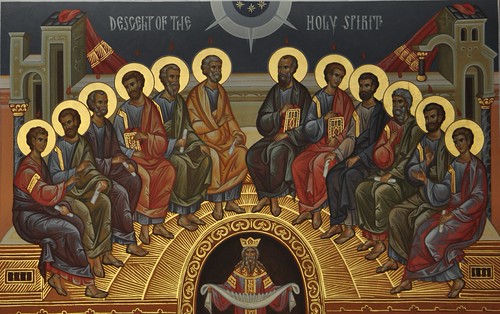On the last day of the feast, the great day, Jesus stood up and proclaimed, “If any one thirst, let him come to me and drink. He who believes in me, as the scripture has said, ‘Out of his heart shall flow rivers of living water.'” Now this he said about the Spirit, which those who believed in him were to receive; for as yet the Spirit had not been given, because Jesus was not yet glorified. (John 7:37-39, from the Gospel Lesson for Pentecost)
 Pentecost – the Feast of the out pouring of the Holy Spirit upon the apostles, upon the entire Church, upon the entire cosmos – is the Feast of the New Covenant, the New Testament. The Jews also celebrated Pentecost – the annual commemoration of the giving of the Covenant on Mt. Sinai. For the Christians Pentecost was not only the establishment of the New Covenant, but the beginning of the New Creation as well. They developed an expectation around the event of Pentecost that it signaled the beginning of the New Age. This world is coming to an end and life in the new world is beginning.
Pentecost – the Feast of the out pouring of the Holy Spirit upon the apostles, upon the entire Church, upon the entire cosmos – is the Feast of the New Covenant, the New Testament. The Jews also celebrated Pentecost – the annual commemoration of the giving of the Covenant on Mt. Sinai. For the Christians Pentecost was not only the establishment of the New Covenant, but the beginning of the New Creation as well. They developed an expectation around the event of Pentecost that it signaled the beginning of the New Age. This world is coming to an end and life in the new world is beginning.
In the New Testament, Pentecost is already something essential to St. Paul and he twice refers to Pentecost (Acts 20:16; 1 Corinthians 16:7-8). After St. Paul the first certain evidence of Pentecost as a Christian Feast comes from Tertullian (ca 225AD).
“Everyone who comes here receives spiritual benefit according to his faith. Those whose faith is poor find little benefit, and sometimes, none at all. On the other hand, God is the Lord of all places. Now – since the Incarnation – Jerusalem is no longer the only sanctified spot; the whole earth shines with glory. There is no place where the incense of prayer cannot rightly rise. The manna of the Word of God rains down on every city and every wilderness; the incorruptible feast can be partaken of in the humblest church of the poorest village. The living waters of grace can be drunk by all who courageously and unflinchingly see Him who says, ‘If any man thirst, let him come unto Me, and drink’ (John 7:37).” (David and Mary Ford, Marriage as a Path to Holiness: Lives of Married Saints, pgs. X1)

 Now when the Day of
Now when the Day of 
 “They spoke in foreign tongues and not that of their fathers, and, a great marvel, a language spoken by those not taught to speak it, and a sign for unbelievers, not for those who believe, that by this would come an accusation against unbelievers, as indeed it is written, ‘In other tongues and by other lips I will speak to this people, and even so they will not give heed to me, says the Lord.’ And ‘they heard.’ Stop here a little and ask how to divide the text. For the reading has a certain ambiguity that is resolved by the punctuation. Did each, then, hear in his own language, as if to say one voice sounded forth but many were heard, so that the air resounded and, to say it more clearly, the voice became voices? Or after ‘they heard’ is there a pause, while ‘speaking in their own languages’ that belonged to the hearers, which had become ‘foreign’? I prefer to put it this way, for in the other interpretation the miracle could concern the hearers rather than the speakers, but in this interpretation it concerns the speakers, who indeed were accused of being drunk, since clearly they worked a miracle with their voices by the Spirit.” (
“They spoke in foreign tongues and not that of their fathers, and, a great marvel, a language spoken by those not taught to speak it, and a sign for unbelievers, not for those who believe, that by this would come an accusation against unbelievers, as indeed it is written, ‘In other tongues and by other lips I will speak to this people, and even so they will not give heed to me, says the Lord.’ And ‘they heard.’ Stop here a little and ask how to divide the text. For the reading has a certain ambiguity that is resolved by the punctuation. Did each, then, hear in his own language, as if to say one voice sounded forth but many were heard, so that the air resounded and, to say it more clearly, the voice became voices? Or after ‘they heard’ is there a pause, while ‘speaking in their own languages’ that belonged to the hearers, which had become ‘foreign’? I prefer to put it this way, for in the other interpretation the miracle could concern the hearers rather than the speakers, but in this interpretation it concerns the speakers, who indeed were accused of being drunk, since clearly they worked a miracle with their voices by the Spirit.” (